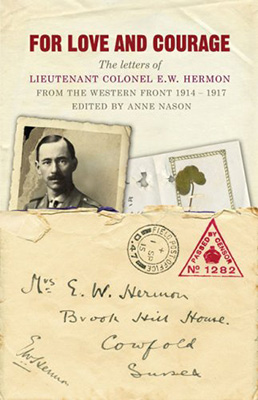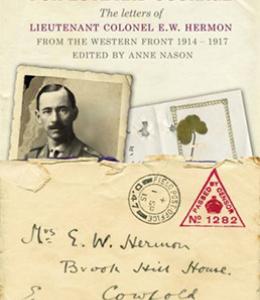Killed in action aged 39
Buried at Roclincourt Military Cemetery Plot I B 1
Edward William was born in Preston to Sydney Hermon and his wife, Fanny. Hermon had a cotton spinning company and the 1881 census states that he employed 553 men, 387 women, 250 boys and 311 girls.
Edward went up to Christ Church in 1898. On the outbreak of the Boer War, he joined the 2nd Volunteer Battalion, the Royal Sussex Regiment. On May 9th 1900, he was gazetted to be a Second Lieutenant in the 7th Hussars. King Edward’s Horse.
In 1904, he married his first cousin, Ethel. Their fathers were brothers and were both in the cotton spinning and manufacturing business. Their eldest child, Betty, was born in the Transvaal in 1906. At the time of the birth of their eldest son Robert Arthur, the following year, they were living in Norwich. Mary was born in Farnborough in 1909. Olga in 1911, and Kenneth in 1915, were born at Brook Hill House, Cowfold, Horsham. Sussex.
Throughout these years, it seems that Edward remained on the Army Retired list and had no formal occupation.
 The following information is taken from letters from Edward to his family, edited and published by his grand-daughter, Mary’s daughter, Anne Nason in 2008:
The following information is taken from letters from Edward to his family, edited and published by his grand-daughter, Mary’s daughter, Anne Nason in 2008:
“For Love And Courage: The Letters Of Lieutenant-Colonel E.W. Hermon From The Western Front 1914-1917” , London: Preface Publishing, 2008 ISBN 978-1-84809-067-5
The letters from Hermon to his wife Ethel and their five children, (collectively known as “The Chugs”) number some 200 written during the war. He sent numerous requests to Ethel for everything from foodstuffs, to lacrosse sticks (to better remove enemy grenades from trenches), to a small pistol and ammunition for close-quarter work in the trenches. The latter duly arrived within weeks, Hermon’s issue weapon having been considered too heavy. Newspapers from England normally arrived by the next morning, in time for Edward to review events with his morning tea. In this manner, he was able to remain remarkably well informed about war activities on other fronts, such as Gallipoli, the Middle East, and Russia
Edward had hoped to command the King Edwards Horse, but events proved otherwise and a rival for the position was sent out from England. Hermon became the commanding officer with the rank of Lt. Colonel, of a battalion of the Northumberland Fusiliers, the 24th (Tyneside Irish) Battalion. His last letter home was written just two days before he was killed. With respect to the coming offensive, he closes that letter by saying: “My dear old lass, I must go to bed now as I must store up what energy I can, as I shall probably need it in these next few days as I’m likely to be busy so far as I can see.” He then offers a final note of love to Ethel and “The Chugs.”
(Attempts have been made to contact Anne Nason through Preface Publishing to seek permission to refer to, and copy from, her copyright.)
Hermon was killed in a hail of bullets on 9 April 1917, while leading his battalion during the Arras Offensive. He was shot through the heart, one bullet slicing through the papers in his top pocket, including the four-leaf clover his wife had given him for good luck. His final words to his Adjutant were 'Go on!', before he sank to his knees and died almost instantaneously. His faithful soldier servant, Buxton, carried him from the battlefield.
He was mentioned in despatches three times and posthumously awarded the D.S.O. Probate was granted to his wife on 16 November 1917. He left £6,360-10s-11d.
His eldest son, Robert, became a Colonel in The Royals, served in WWII and was awarded the DSO. He died in 1963.


